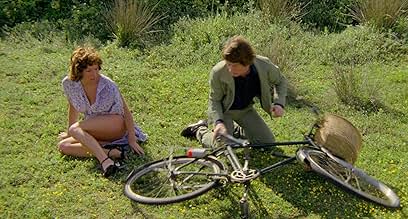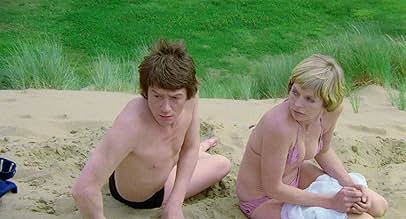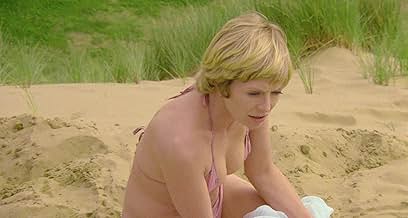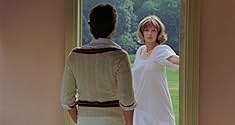IMDb RATING
6.5/10
5.8K
YOUR RATING
A traveller by the name of Crossley forces himself upon a musician and his wife in a lonely part of Devon, and uses the aboriginal magic he has learned to displace his host.A traveller by the name of Crossley forces himself upon a musician and his wife in a lonely part of Devon, and uses the aboriginal magic he has learned to displace his host.A traveller by the name of Crossley forces himself upon a musician and his wife in a lonely part of Devon, and uses the aboriginal magic he has learned to displace his host.
- Director
- Writers
- Stars
- Awards
- 1 win & 1 nomination total
Graham Kingsley Brown
- Village Churchgoer
- (uncredited)
Joanna Szczerbic
- Cricket Umpire
- (uncredited)
- Director
- Writers
- All cast & crew
- Production, box office & more at IMDbPro
Featured reviews
During a cricket game in the grounds of an asylum, patient Charles Crossley is telling a story to his opposite scorekeeper Robert. He tells of how he came across musician Anthony Fielding outside church one day, and he invited back home for dinner. Over dinner he tells Anthony and his wife Rachael that of his last two decades of living in the Australian outback, where he learned many spells from the aboriginal witch doctors and one being the shout. It can cause instant death when heard. Soon Charles settles into the homestead, where he has Anthony and Rachael under his thumb, as he fears him and she's infatuated by him.
Weird, baffling and truly novel passes through my mind whenever I watch this sedately complex, courageous and alienating late 70's British experimental thriller. The way it has layer upon layer, goes on to ambitiously build a minor and gripping structure, which its inspired psychological strangle hold and mystical air takes shape as to how genuine the pieces are and if they do come together. Does it make sense? Well, it's hard to say what the bigger picture means, but it is indeed curiously haunting, daunting and truly unpredictable. The non-linear story and compact script chips away with plenty of cryptic messages inter-cutting the soft, dream-like touch brought on by director Jerzy Skolimowski. He gives the film such an hypnotic appeal amongst its arty brushes, where its swirling electronic score peaks in the right places and Mick Molloy's sublime framing emits elegant photography work. Those scenes involving the 'shout' are lethal, and only increase to the lurking eeriness created by top-notch sound FX. Visually the film has a powerful, isolated and lush setting that works with the story's spiritual and supernatural journey. The three lead performances are sensational, but it's Alan Bates who dominates the show with his startling and obscure turn as the tramp/patient. John Hurt as the downtrodden turned bewitched composer gives in a stellar performance and Susanna York, as his wife is also great. The talented Tim Curry shows up in a small, but effective role.
Quite an unusual puzzle, which is strangely compelling, unique and very well made.
Weird, baffling and truly novel passes through my mind whenever I watch this sedately complex, courageous and alienating late 70's British experimental thriller. The way it has layer upon layer, goes on to ambitiously build a minor and gripping structure, which its inspired psychological strangle hold and mystical air takes shape as to how genuine the pieces are and if they do come together. Does it make sense? Well, it's hard to say what the bigger picture means, but it is indeed curiously haunting, daunting and truly unpredictable. The non-linear story and compact script chips away with plenty of cryptic messages inter-cutting the soft, dream-like touch brought on by director Jerzy Skolimowski. He gives the film such an hypnotic appeal amongst its arty brushes, where its swirling electronic score peaks in the right places and Mick Molloy's sublime framing emits elegant photography work. Those scenes involving the 'shout' are lethal, and only increase to the lurking eeriness created by top-notch sound FX. Visually the film has a powerful, isolated and lush setting that works with the story's spiritual and supernatural journey. The three lead performances are sensational, but it's Alan Bates who dominates the show with his startling and obscure turn as the tramp/patient. John Hurt as the downtrodden turned bewitched composer gives in a stellar performance and Susanna York, as his wife is also great. The talented Tim Curry shows up in a small, but effective role.
Quite an unusual puzzle, which is strangely compelling, unique and very well made.
I don't recall now how I'd heard of this movie, but having heard of it, I was motivated enough to get a copy from the Amazon UK site (region-free players are a must; region encoding should be abolished!).
From the very start of the movie, it's clear it will be unusual. First we see a woman drive up to a building. She is ushered into a room where there are three dead men, apparently naked, laid out under white sheets on what seem to be dining tables. She stops at the third one. Then, we see an black, likely aboriginal, man wandering in a desert or among sand dunes, and he approaches with a sharp bone. Then a man (Tim Curry) arrives at an asylum, where he is assigned the job of score-keeping for a game of cricket the patients and staff are about to begin. The other scorekeeper, one of the patients, starts to tell him a story....
That's a lot of jumping around just to start the film! There are layers in the film, due to the storytelling, and not everything is chronological, and perhaps not everything is even true.
The story involves the man telling the story (Alan Bates) and one of the men playing cricket (John Hurt). John Hurt's character plays organ at a church, when he gets there on time, anyway, and at home records a variety of sounds, amplifying them in such a way they sound unusual. He meets Alan Bates, a strange man who had learned some aboriginal magic when he lived in Australia, and Bates manages to enter Hurt's home and life.
The story structure and the involvement of an asylum called to mind The Cabinet of Dr. Caligari for me, and now seeing the comments of others, I see I'm not alone. One other movie that came to mind while watching The Shout was Picnic at Hanging Rock (1975) because of the Australian weirdness and artiness in both films.
I can't claim to understand everything in the film. For example, at one point a character wakes up and he's temporarily confused about his identity and profession, a problem that reoccurs at least once thereafter. Additionally, there's some digging in the sand for rocks which seem related to people somehow. In spite of this, or perhaps because of this to a degree (I like some mystery sometimes), I enjoyed the movie, and I'm glad I bought it.
From the very start of the movie, it's clear it will be unusual. First we see a woman drive up to a building. She is ushered into a room where there are three dead men, apparently naked, laid out under white sheets on what seem to be dining tables. She stops at the third one. Then, we see an black, likely aboriginal, man wandering in a desert or among sand dunes, and he approaches with a sharp bone. Then a man (Tim Curry) arrives at an asylum, where he is assigned the job of score-keeping for a game of cricket the patients and staff are about to begin. The other scorekeeper, one of the patients, starts to tell him a story....
That's a lot of jumping around just to start the film! There are layers in the film, due to the storytelling, and not everything is chronological, and perhaps not everything is even true.
The story involves the man telling the story (Alan Bates) and one of the men playing cricket (John Hurt). John Hurt's character plays organ at a church, when he gets there on time, anyway, and at home records a variety of sounds, amplifying them in such a way they sound unusual. He meets Alan Bates, a strange man who had learned some aboriginal magic when he lived in Australia, and Bates manages to enter Hurt's home and life.
The story structure and the involvement of an asylum called to mind The Cabinet of Dr. Caligari for me, and now seeing the comments of others, I see I'm not alone. One other movie that came to mind while watching The Shout was Picnic at Hanging Rock (1975) because of the Australian weirdness and artiness in both films.
I can't claim to understand everything in the film. For example, at one point a character wakes up and he's temporarily confused about his identity and profession, a problem that reoccurs at least once thereafter. Additionally, there's some digging in the sand for rocks which seem related to people somehow. In spite of this, or perhaps because of this to a degree (I like some mystery sometimes), I enjoyed the movie, and I'm glad I bought it.
I don't even know where to start but I will try. Alan Bates is mystifying and terrifying - and I get the oddest feeling that the Coen Brothers love this movie and bit the character for Javier Bardem in No Country For Old Men. John Hurt plays a character who is offensively passive but very likable and he does it with flying colors - his performance is great. Susannah York's role requires great dynamic and she pulls it off menacingly. The plot is so minimal and open-ended it doesn't even feel like a plot, but the experience goes unmatched. The environments are often breathtaking and the editing, pacing, and "progression" of the plot makes the entire movie feel like a bad dream. Through the second half of the film, everything that occurs is so out-there that you can no longer question any small detail - everything is absurd but it feels organic and cohesive in it's own freakish sense. Admittedly, I don't understand the ending, but I don't even care - it still feels climactic and satisfying, and most outstanding dreams are not fully explicable either... for fans of any and all oddities... this one is not to be missed.
An inmate (Bates) at a lunatic asylum relates a bizarre tale to a visiting doctor (Curry) during a surreal cricket match between the patients and staff. The story details in flashback, how Bates came between a man (Hurt) who happens to be playing in the match, as a doctor I believe, and his wife (York) who is seen at the beginning and end of the film as a nurse at the asylum.
Man, where's this movie been all my life? Brilliant, absolutely brilliant but mysteriously forgotten British psycho horror flick of the late 70s, that features among everything else, an A-1 cast. It reminds me once again how dumb the Hannibal movies are. Ever get the feeling Anthony Hopkins realizes this too? Watch him sometimes when he thinks the camera isn't on him, he's laughing his butt off. Sorry, if you like disturbing well made horror films, that delve into the subject of madness and perspective vs. reality? You will like this. The old gimmick of Dr. Caligari has been used and abused, but this film plays honest because you know from the outset, that a madman is narrating the story. The film is effective enough, not to have to resort to springing that on you as surprise ending. You know that Bates is in a nuthouse going in, and are reminded of it throughout, but somehow you still forget it, or get confused about it as you get absorbed into the action. And what's even more upsetting is the footage at the asylum doesn't ring true either, if you know what I mean. Again, what is real? You're asking the wrong bloke, I'm sure I don't get it at all, but I love it, and I recommend it unreservedly. Taken from a story by the immortal Robert Graves. A must see!
Man, where's this movie been all my life? Brilliant, absolutely brilliant but mysteriously forgotten British psycho horror flick of the late 70s, that features among everything else, an A-1 cast. It reminds me once again how dumb the Hannibal movies are. Ever get the feeling Anthony Hopkins realizes this too? Watch him sometimes when he thinks the camera isn't on him, he's laughing his butt off. Sorry, if you like disturbing well made horror films, that delve into the subject of madness and perspective vs. reality? You will like this. The old gimmick of Dr. Caligari has been used and abused, but this film plays honest because you know from the outset, that a madman is narrating the story. The film is effective enough, not to have to resort to springing that on you as surprise ending. You know that Bates is in a nuthouse going in, and are reminded of it throughout, but somehow you still forget it, or get confused about it as you get absorbed into the action. And what's even more upsetting is the footage at the asylum doesn't ring true either, if you know what I mean. Again, what is real? You're asking the wrong bloke, I'm sure I don't get it at all, but I love it, and I recommend it unreservedly. Taken from a story by the immortal Robert Graves. A must see!
Previous commentators have remarked upon the similarity of the framing story of this film (that reunites the author and star of 'I Claudius') to 'The Cabinet of Dr. Caligari'; but no one yet seems to have noticed the resemblance to Pasolini's 'Teorema', in which Terence Stamp rocks the boat of a bourgeois household with a similar mystical droit du seigneur to that exercised by Alan Bates over a youthful John Hurt's luscious wife Susannah York (who at one point has a remarkably feral nude scene on all fours), despite his unkempt appearance and army greatcoat that recall Davies from 'The Caretaker' more than Bates' earlier saturnine romantic leads.
Most reviewers seem also to be taking this tall tale of bucolic rumpy pumpy with more of a straight face than it's actual makers may have been. But it clearly needs to be seen (and listened to) more than once.
Most reviewers seem also to be taking this tall tale of bucolic rumpy pumpy with more of a straight face than it's actual makers may have been. But it clearly needs to be seen (and listened to) more than once.
Did you know
- TriviaThis movie was notable for its time, for its use of an electronic and avant-garde music score, which, when heard in theaters in Dolby Stereo, was aurally separating and distorting. Reportedly, forty different music tracks were used for the sound.
- Quotes
Charles Crossley: Get out of here Anthony, or I'll shout your bloody ears off.
- ConnectionsFeatured in L'Irlandais (2011)
- How long is The Shout?Powered by Alexa
Details
- Release date
- Country of origin
- Language
- Also known as
- El grito
- Filming locations
- Devon, England, UK(photographed entirely on location in North Devon, England)
- Production companies
- See more company credits at IMDbPro
Box office
- Budget
- £5,000,000 (estimated)
Contribute to this page
Suggest an edit or add missing content





























